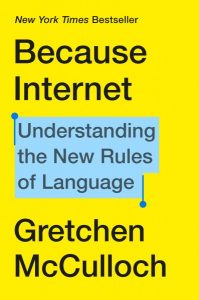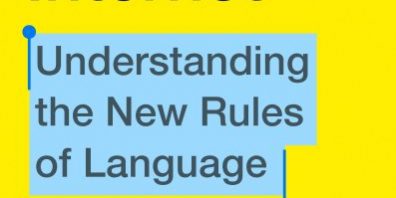 I admit it. I was one of those people who was concerned that the use of emojis in text and email messages was evidence that we might be moving towards a post-literate society. Then I heard Gretchen McCullough interviewed on NPR about her new book Because Internet: Understanding the New Rules of Language. I subsequently purchased the title for the library’s collection and just finished reading it. And, I must say, I feel a whole lot better now!
I admit it. I was one of those people who was concerned that the use of emojis in text and email messages was evidence that we might be moving towards a post-literate society. Then I heard Gretchen McCullough interviewed on NPR about her new book Because Internet: Understanding the New Rules of Language. I subsequently purchased the title for the library’s collection and just finished reading it. And, I must say, I feel a whole lot better now!
McCullough is an internet linguist: she analyzes the language of the internet, for the people of the internet. She has a Master’s in linguistics from McGill University and writes a column for WIRED and writes a blog on the subject as well as hosting a podcast.
In Because Internet McCullough explores the deep forces that shape our language and influence the way we communicate with each other. She dissects “types” of “internet people”…Old (as in very early adopters) , Full, Semi and Post and you cannot be alive and in possession of a smart phone and not recognize yourself as a member of one of these groups. She demonstrates how differing trends moved and continue to move through our internet use and offers helpful explanations about how differing generations use, or DON’T use punctuation. Or capitalization. Or emojis or emoticons. An entertaining and informative read! And, news flash! Emojis are evidence of progress and evolution of communication.
There were several quotes I tagged as especially useful or informative: “When we learn to write in ways that communicate our tone of voice, not just our mastery of rules, we learn to see writing not as a way of asserting our intellectual superiority, but as a way of listening to each other better. We learn to write not for power, but for love.” (pg. 154.)
“Expanding our tools for conveying our intentions may even make us better at reading other people’s mental states by giving us more practice taking them on.” (pg.194) “What we’re arriving at, between topography and visuals, is a flexible set of ways to communicate our intentions and share space online.” (pg.195)







